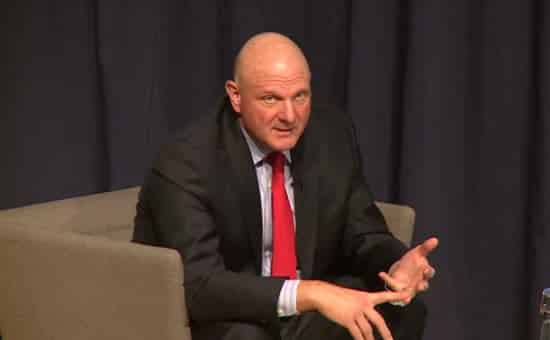Ideas matter, stick with it, and figure out the right measure of success
(Source: Youtube)
STEVE Ballmer spoke today at Oxford’s Said Business School, the world’s leading business community creating ideas with global impact.
A few hours later, he spoke at the Oxford Union, the world’s most prestigious debating society.
We were fortunate to attend the second talk, and wanted to communicate the three tips for start ups that Ballmer shared with the audience.
As you know, Ballmer is the recently retired CEO of Microsoft, which is not by any measure a start up. It turns over more than $70 billion in revenue and generates more than $20 billion in profit each year.
And so, you might be skeptical about what kind of advice Ballmer might have for start ups.
Ballmer preempted our doubts by explaining that things have not always been this way. When he dropped out of Stanford to join Microsoft 34 years ago, it had only 30 staff. And while this may be larger than most start ups, it was still early days. It was the beginning of a long road for Microsoft, which today has over 100,000 employees.
Ballmer is an energetic speaker, at the same time boisterous and self-effacing, charasmatic and plain-spoken. Under his reign as CEO, Microsoft’s revenues tripled, and its profits doubled. Ballmer admits to making his fair share of mistakes at Microsoft, but his business success is rivaled by few.
Here are Steve’s three tips for start ups:
1. Ideas Matter: Good ideas are hard to come by. Don’t pursue a lousy idea just because you’re desperate to do a start up right now. Try to find a good enough idea that it will be really worth pursuing. Steve’s advice may sound like common sense, but it flies in the face of the currently popular “lean start up methodology” that encourages entrepreneurs to just get started by building a minimum viable product. While it can be easy to get started, is the initial idea good enough?
2. Perseverance: Success is unlikely to come quickly. Ballmer directly challenges the rhetoric that start ups should succeed quickly and fail fast. He tells us that really great start ups don’t fail fast, they stick at it, and modify their ideas as necessary. If you have a great team, which is excited and working in a fertile area, then you need to be willing to keep going until you make it. It can often take more than a decade for a company to hit its straps.
3. Profitability: Will someone pay for it? Ballmer’s third piece of advice is particularly relevant in the context of Facebook’s recent $19 billion acquisition of Whatsapp. Whatsapp has around 470 million users but only earned around $20 million in revenues last year. Did Facebook pay too much? In today’s environment, Ballmer explains that there are lots of ways to measure success. Sometimes having a lot of users is a really good indicator, and sometimes it’s a false measure. You need to figure out the right measure of success.
